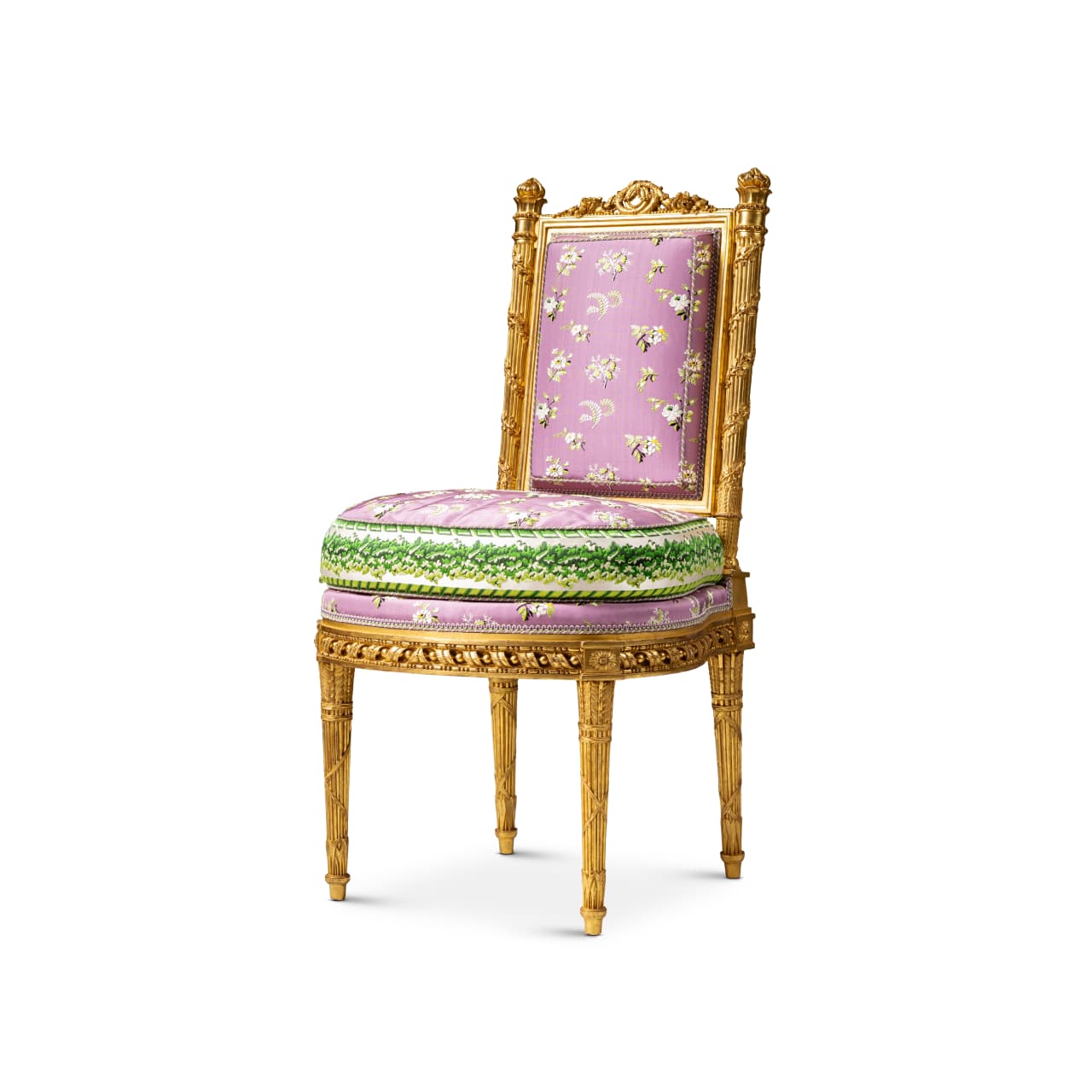Marie Antoinette Chair Sells for a Record US$2.8 Million
A royal chair created for the boudoir of Marie Antoinette achieved €2.6 million (US$2.8 million) Thursday evening at Sotheby’s in Paris, setting a record for a single 18th-century chair.
The sale was the first in a series of four physical and online auctions being held this month featuring the collection of the late Hubert Guerrand-Hermès, a fifth-generation descendant of Thierry Hermès, founder of the French luxury house.
“Tonight’s sale was a celebration of prestigious provenance, as the undeniable response to Hubert Guerrand-Hermès’ eye for collecting showcased the continued demand for the most elevated world of refinement,” Mario Tavella, president of Sotheby’s France and chairman of Sotheby’s Europe, said in a news release.
The Louis XVI gilt walnut chair, made circa 1784-85, ignited a “flurry of bidding,” according to Tavella. It was one of 60 pieces sold on Thursday for a total of nearly €23 million, with fees, triple a pre-sale high estimate of nearly €9 million (which did not include fees). More than 80% of lots sold for more than their high estimates.
Guerrand-Hermès was a passionate, wide-ranging collector. The 1,000-plus items being auctioned across the four sales span centuries and include royal furniture and rare books in addition to works by contemporary artists such as Antony Gormley and Anish Kapoor.
Collectors appeared drawn to Guerrand-Hermès’ diverse tastes, fiercely bidding as much for the contemporary art as the 18th-century furniture, according to Tavella.
While the record-setting, carved, and regilded Louis XVI chair—which was thought to have been created for Queen Marie-Antoinette’s intimate personal rooms at Versailles—stole the headlines, the top lot of the evening was a monochrome canvas by Pierre Soulages, Painting 130 x 162 cm, February 28, 1970, which sold for €3.1 million —the highest price for a 1970s work by the French artist. Guerrand-Hermès had bought the painting at a Sotheby’s Paris auction nearly 14 years ago for €720,750
Guerrand-Hermès, who died in 2016 at the age of 75, had been vice chairman of Emile Hermès SARL, which represents the family shareholders, and general manager of the group’s real estate companies. He also served as a foreign trade adviser to the French government and was made an officer of France’s Legion of Honor in 1999.
The Guerrand-Hermès auctions will continue this week with a focus on the Duchesse de Berry—described by Sotheby’s as “one of the most famous and fascinating aristocratic figures of the 19th century.”
 Copyright 2020, Dow Jones & Company, Inc. All Rights Reserved Worldwide. LEARN MORE
Copyright 2020, Dow Jones & Company, Inc. All Rights Reserved Worldwide. LEARN MORE
This stylish family home combines a classic palette and finishes with a flexible floorplan
Just 55 minutes from Sydney, make this your creative getaway located in the majestic Hawkesbury region.
Impact investing is becoming more mainstream as larger, institutional asset owners drive more money into the sector, according to the nonprofit Global Impact Investing Network in New York.
In the GIIN’s State of the Market 2024 report, published late last month, researchers found that assets allocated to impact-investing strategies by repeat survey responders grew by a compound annual growth rate (CAGR) of 14% over the last five years.
These 71 responders to both the 2019 and 2024 surveys saw their total impact assets under management grow to US$249 billion this year from US$129 billion five years ago.
Medium- and large-size investors were largely responsible for the strong impact returns: Medium-size investors posted a median CAGR of 11% a year over the five-year period, and large-size investors posted a median CAGR of 14% a year.
Interestingly, the CAGR of assets held by small investors dropped by a median of 14% a year.
“When we drill down behind the compound annual growth of the assets that are being allocated to impact investing, it’s largely those larger investors that are actually driving it,” says Dean Hand, the GIIN’s chief research officer.
Overall, the GIIN surveyed 305 investors with a combined US$490 billion under management from 39 countries. Nearly three-quarters of the responders were investment managers, while 10% were foundations, and 3% were family offices. Development finance institutions, institutional asset owners, and companies represented most of the rest.
The majority of impact strategies are executed through private-equity, but public debt and equity have been the fastest-growing asset classes over the past five years, the report said. Public debt is growing at a CAGR of 32%, and public equity is growing at a CAGR of 19%. That compares to a CAGR of 17% for private equity and 7% for private debt.
According to the GIIN, the rise in public impact assets is being driven by larger investors, likely institutions.
Private equity has traditionally served as an ideal way to execute impact strategies, as it allows investors to select vehicles specifically designed to create a positive social or environmental impact by, for example, providing loans to smallholder farmers in Africa or by supporting fledging renewable energy technologies.
Future Returns: Preqin expects managers to rely on family offices, private banks, and individual investors for growth in the next six years
But today, institutional investors are looking across their portfolios—encompassing both private and public assets—to achieve their impact goals.
“Institutional asset owners are saying, ‘In the interests of our ultimate beneficiaries, we probably need to start driving these strategies across our assets,’” Hand says. Instead of carving out a dedicated impact strategy, these investors are taking “a holistic portfolio approach.”
An institutional manager may want to address issues such as climate change, healthcare costs, and local economic growth so it can support a better quality of life for its beneficiaries.
To achieve these goals, the manager could invest across a range of private debt, private equity, and real estate.
But the public markets offer opportunities, too. Using public debt, a manager could, for example, invest in green bonds, regional bank bonds, or healthcare social bonds. In public equity, it could invest in green-power storage technologies, minority-focused real-estate trusts, and in pharmaceutical and medical-care company stocks with the aim of influencing them to lower the costs of care, according to an example the GIIN lays out in a separate report on institutional strategies.
Influencing companies to act in the best interests of society and the environment is increasingly being done through such shareholder advocacy, either directly through ownership in individual stocks or through fund vehicles.
“They’re trying to move their portfolio companies to actually solving some of the challenges that exist,” Hand says.
Although the rate of growth in public strategies for impact is brisk, among survey respondents investments in public debt totaled only 12% of assets and just 7% in public equity. Private equity, however, grabs 43% of these investors’ assets.
Within private equity, Hand also discerns more evidence of maturity in the impact sector. That’s because more impact-oriented asset owners invest in mature and growth-stage companies, which are favored by larger asset owners that have more substantial assets to put to work.
The GIIN State of the Market report also found that impact asset owners are largely happy with both the financial performance and impact results of their holdings.
About three-quarters of those surveyed were seeking risk-adjusted, market-rate returns, although foundations were an exception as 68% sought below-market returns, the report said. Overall, 86% reported their investments were performing in line or above their expectations—even when their targets were not met—and 90% said the same for their impact returns.
Private-equity posted the strongest results, returning 17% on average, although that was less than the 19% targeted return. By contrast, public equity returned 11%, above a 10% target.
The fact some asset classes over performed and others underperformed, shows that “normal economic forces are at play in the market,” Hand says.
Although investors are satisfied with their impact performance, they are still dealing with a fragmented approach for measuring it, the report said. “Despite this, over two-thirds of investors are incorporating impact criteria into their investment governance documents, signalling a significant shift toward formalising impact considerations in decision-making processes,” it said.
Also, more investors are getting third-party verification of their results, which strengthens their accountability in the market.
“The satisfaction with performance is nice to see,” Hand says. “But we do need to see more about what’s happening in terms of investors being able to actually track both the impact performance in real terms as well as the financial performance in real terms.”
This stylish family home combines a classic palette and finishes with a flexible floorplan
Just 55 minutes from Sydney, make this your creative getaway located in the majestic Hawkesbury region.






















